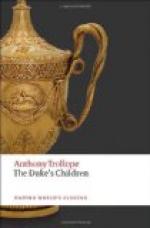In all this he was very great; but when it might fall to his duty either to suggest or defend any real piece of proposed legislation he was less happy. On this occasion he had been driven to take the matter in hand because he had previously been concerned in it as a lawyer. He had allowed himself to wax angry as he endeavoured to answer certain personal criticisms. Now Sir Timothy was never stronger then when he simulated anger. His mock indignation was perhaps his most powerful weapon. But real anger is a passion which few men can use with judgement. And now Sir Timothy was really angry, and condescended to speak of our old friend Phineas who had made the onslaught as a bellicose Irishman. There was an over-true story as to our friend having once been seduced into fighting a duel, and those who wished to decry him sometimes alluded to the adventure. Sir Timothy had been called to order, but the Speaker had ruled ‘bellicose Irishman’ was not beyond the latitude of parliamentary animadversion. Then Sir Timothy had repeated the phrase with emphasis, and the Duke hearing it in the gallery had made his remark as to the unwonted eloquence of his son’s parliamentary chief.
‘Surely we ought to listen to him,’ said the Duke. And for a short time they did listen. ‘Sir Timothy is not a man I like, you know,’ said the son, feeling himself obliged to apologise for his subjection to such a chief.
‘I never particularly loved him myself.’
‘They say he is a sort of necessity.’
‘A Conservative Fate,’ said the Duke.
’Well, yes; he is so,—so awfully clever! We all feel that we could not get on without him. When you were in, he was one of your party.’
’Oh yes;—he was one of us. I have no right to complain of you for using him. But when you say you could not get on without him, does it not occur to you that should he,—let us say be taken to heaven,—you would have to get on without him.’




